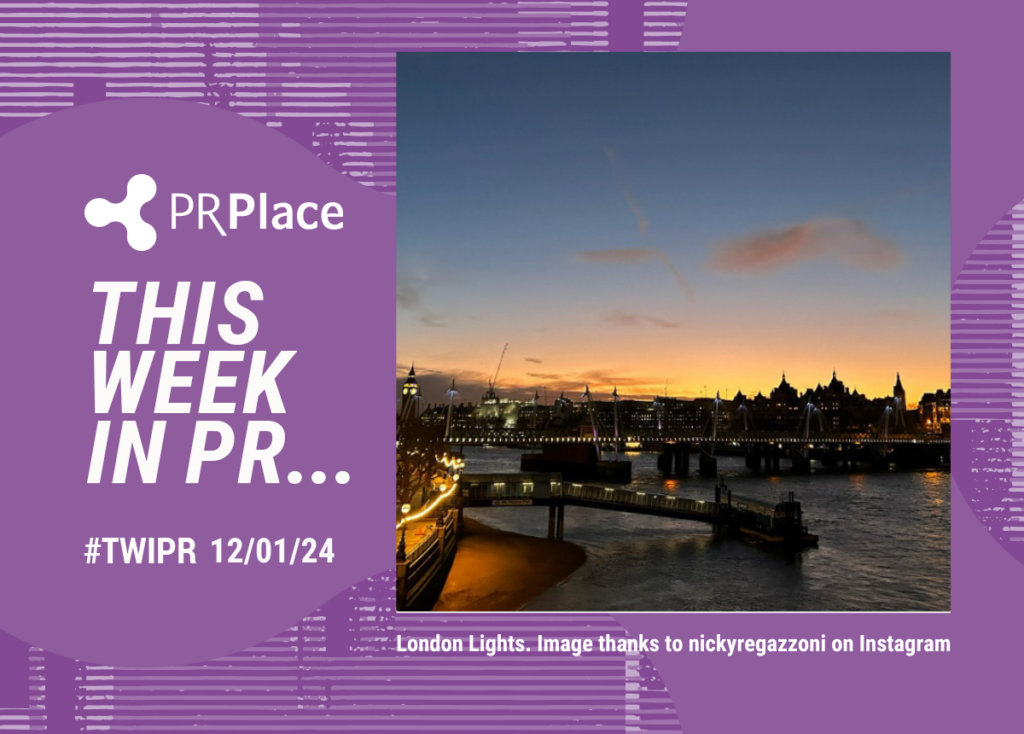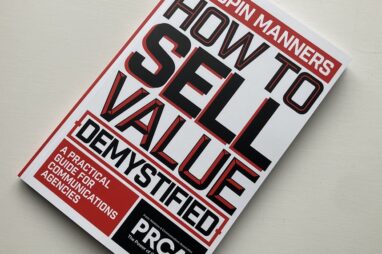This week in PR (12 January)

About the author
Richard Bailey Hon FCIPR is editor of PR Academy's PR Place Insights. He teaches and assesses undergraduate, postgraduate and professional students.

It happened this week
- Derek Draper 1967-2024: There was an affectionate tribute to Derek Draper in the Sunday Times (7 January) by Decca Aitkenhead, who had also first met him at Manchester University in 1990. Draper became more widely known (notorious even) as a New Labout ‘spin doctor’. ‘Before poaching him from [Gordon] Brown, Peter Mandelson, then Tony Blair’s svengali in opposition and now a peer, consulted Baroness Morgan of Huyton for a reference. ‘Rough, tough and ruthless’ she told him… Mandelson hired the ‘spin doctor’s spin doctor on the spot.’ ‘Expecting to loathe Draper, I couldn’t understand at first why I liked him,’ writes Aitkenhead. ‘He was quicker witted, bigger-hearted and more fearless than anyone I knew. By a country mile, he was the cleverest person I had met’. His second career was as a psychotherapist and he became known as the man who married TV present Kate Garraway before suffering and eventually dying from long Covid.
Post Office Horizon scandal
- Jonathan Owen: Post Office scandal: who are the main PR players? (11 January)
‘Comms around the scandal are being handled in-house. Richard Taylor, a former partner at Portland and ex-group director of corporate affairs and comms at Morrisons, is the Post Office’s group corporate affairs, comms and brand director. His team includes Karim Aziz, head of media relations; and Emma Hancock, head of consumer PR.’ - Tamara Littleton: The Post Office Scandal and psychological safety (10 January)
‘I talk a lot about the importance of psychological safety in crisis training, particularly when I’m working with leaders. If you don’t have a culture of psychological safety in your organisation (and the Post Office certainly didn’t) people won’t come forward to report issues to you, for fear of not being believed, or of being blamed. That leads issues festering, unresolved.’ - Amanda Coleman: The power of the docu-drama (8 January)
‘The ITV drama was able to bring home the human impact of the situation. But it should not require this to happen for the Government to look at what it can do to help with quashing convictions and providing compensation. Given the scale of this scandal it is something that should have already been underway.’
- Robert Minton-Taylor: Take action over Post Office Horizon scandal (7 January)
‘At the time the criminal prosecutions expert for the Horizon IT inquiry gave testimony that: “A form of words was put together … a significant part of that asserting there were no problems … even where faults were being understood [by the Post Office].’
Profession and ethics
- Richard Bagnall: 30 Years on: The journey from CIPR Associate to Fellow (9 January)
‘In the days when the internet didn’t exist, mobile phones hadn’t entered common usage and a typewriter with a memory module for addresses was cutting edge, the [Hollis] Press & PR Annual was literally the bible of our industry, a thumbed and closely guarded copy on every PR professional and journalist’s desk.
Purpose, climate and ESG
SUSTAINABILITY COMMUNICATION DIPLOMA
- Sarah Waddington: Evaluating board performance: Assessing effectiveness to strengthen governance (11 January)
‘In this article, we explore how to evaluate your board’s performance. It’s a common governance risk found in organisations of all sizes.’ - John Harrington: Focus corporate ‘purpose’ messaging on staff – FGS Global report (9 January)
‘Businesses will need to focus more on communicating their purpose to their staff – this has the twin benefits of helping them demonstrate that they have a role to play in communities where they operate and where staff live, and to win the war for talent.’ - Joe Phillips: COP28: Reflecting on Climate Action Delays (8 January)
‘COP28 saw an alarming increase in the presence of fossil fuel lobbyists, with around 2,400 attendees being connected to the coal, oil and gas industries, which raised serious conflict of interest concerns.’
Consulting, skills and careers
- Ben Shenoy: Reflections on the Collaborative Corporate (11 January)
‘The hypothesis behind Headland’s creation was that value could be created by offering clients ‘everything briefs’ – integrated offerings weaving together disparate strands of expertise, such as reputation development, corporate affairs, financial public relations and political campaigning.’ - Ben Smith: My career in hindsight: Bieneosa Ebite on the PRmoment Podcast (9 January)
‘Historically, pharma companies did take into account the diversity of populations when conducting clinical trials. Typically, vaccines were tested on white men and produced for white men.’
Gender, diversity and wellbeing
Public and third sectors
Politics, public affairs and public sphere
- WA: Political Update with Steve Richards – unpacking the year ahead (11 January)
‘Tory MPs are pessimistic about their chances of retaining power, with some senior MPs fearing a 1997-style wipeout – or worse. This reflects fear of an opposition ‘pincer movement’, as Labour target northern ‘Red Wall’ seats, while the Liberal Democrats take leafy ‘Blue Wall’ seats in the south.’ - Lucy Grove: The UK’s Skills Revolution is Still a Long Way Off (9 January)
‘Increasing the number of young people choosing vocational pathways is necessary for the UK to deliver on its infrastructure and net zero ambitions, and compete on a global stage.’ - Farzana Baduel: Public Affairs and PR Strategies for Meaningful Campaigns with Paul Gerrard
(9 January)
‘Some of the finest public servants I’ve met – and I’ve met many – were government ministers. Government ministers who were dedicated to trying tol improve society. The idea that all politicians are truth-twisters is slightly cock-eyed.’
Brands, content, community and creativity
- Arun Sudhaman: Creativity In PR Study: Welcome To The Earned Era (8 January)
‘This year’s study brought a particular focus to the development of earned-first creative ideas, with only 47% of respondents believing that PR firms are viewed by clients as the best agency option to lead these.’
Behaviour and influence
- Nick Barron: A new approach to understanding and measuring trust is needed (11 January)
‘Asking the public to think about trust in abstract and intangible ways is unhelpful and unwise. Trust isn’t abstract. Neither is it intangible. It’s concrete and there are better ways to explore and scrutinise it.’
Crisis, risk and reputation
Internal communication
INTERNAL COMMUNICATION DIPLOMA
- Jenni Field: How aligned are HR and Internal Communications? (10 January)
‘For this article I’m going to take each of the HR priorities and discuss them linked to the trends for internal communication. Based on my own work with clients, industry conversations and reading, it’ll be a mix of some thinking out loud and some ideas to take this forward into 2024.’
- Jennifer Sproul, Cathryn Barnard, Dominic Walters with Steve Wells: Trend Spotting: Risks and Opportunities for Internal Communication in 2024 [podcast] (10 January)
‘If the last few years has taught us anything, it’s that eve our near-term future can be incredibly uncertain – whether it’s pandemics, or war in Europe. One of the things we’ve started to see having an impact is around hybrid and remote working. The trend was already in place before the pandemic.’ - Rachel Miller and Debbie West: How to use audio for IC in 2024 (5 January)
‘Podcast listenership in general is higher among younger populations and I think this points to a future where people entering work for the first time will increasingly expect their employer to have a podcast.’
Media, digital and technology
-
- Gini Dietrich: Navigating the New Normal: Harnessing the Power of AI In PR (9 January)
‘[Chris Penn said] eventually, the role of the communicator will not be unlike a conductor. You’ll have a bunch of robots doing different jobs, and your job will be to ensure you’re getting what you need out of them, ethically and responsibly.’ - Neville Hobson: FIR at 19: A Milestone in Podcasting (7 January)
‘Nineteen years ago this past week, Shel Holtz and I founded and launched the For Immediate Release podcast. Back then, podcasting was in its infancy and we began a journey at a time when it was more of an experiment than a mainstream platform.’
- Gini Dietrich: Navigating the New Normal: Harnessing the Power of AI In PR (9 January)
Academic, training and qualifications
Join us in January for our next open event and find out about studying for a @CIPR_Global qualification. https://t.co/Uz28sA3NmQ
— PR Academy (@pracademy) December 12, 2023


